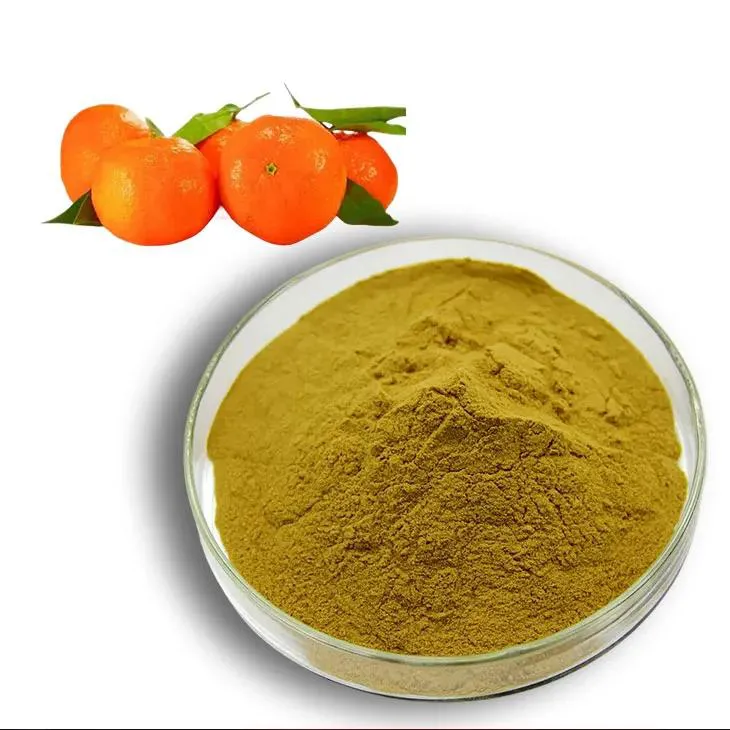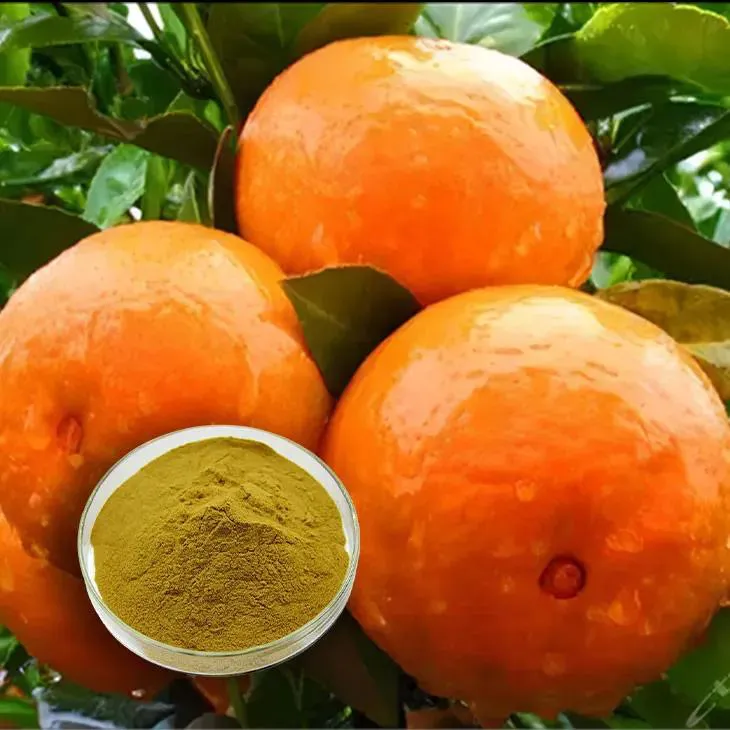- 0086-571-85302990
- sales@greenskybio.com
Nature's best citrus bioflavonoids.
2024-11-28

Introduction to Citrus bioflavonoids
Citrus bioflavonoids are truly remarkable natural compounds that are an essential part of citrus fruits. These fruits, such as oranges, lemons, grapefruits, and limes, are not only delicious but also a rich source of these bioactive substances. Citrus bioflavonoids play a significant role in the overall health - promoting properties of citrus fruits. They are, in a sense, nature's gift to us, offering a plethora of benefits.

Antioxidant Power of Citrus Bioflavonoids
One of the most important aspects of citrus bioflavonoids is their antioxidant activity. Antioxidants are substances that can prevent or slow damage to cells caused by free radicals, which are unstable molecules. Free radicals are constantly produced in our bodies as a result of normal metabolic processes, as well as exposure to environmental factors like pollution, radiation, and certain chemicals.
When free radicals accumulate in the body, they can cause oxidative stress. This oxidative stress can damage cells, proteins, and DNA, leading to various health problems, including premature aging, heart disease, cancer, and neurodegenerative diseases. Citrus bioflavonoids, with their antioxidant properties, act as a defense mechanism against free radicals.
They work by donating electrons to free radicals, thereby neutralizing them and preventing them from causing further damage. This helps to maintain the integrity of cells and keeps them functioning properly. For example, Hesperidin, a common citrus bioflavonoid found in oranges, has been shown to have significant antioxidant effects. It can scavenge free radicals in the body, reducing oxidative stress and protecting cells from damage.

Benefits for Digestion
Citrus bioflavonoids also have a positive impact on digestion. They play a role in enhancing the absorption of nutrients. Our digestive system is responsible for breaking down food into smaller components and absorbing nutrients such as vitamins, minerals, and amino acids. However, various factors can affect the efficiency of this process.
Citrus bioflavonoids can help improve the function of the digestive tract. For instance, they may enhance the activity of digestive enzymes. These enzymes are crucial for breaking down complex carbohydrates, proteins, and fats in the food we eat. By promoting the action of these enzymes, citrus bioflavonoids can ensure that nutrients are more effectively broken down and absorbed by the body.
Additionally, some citrus bioflavonoids have been shown to have a prebiotic - like effect. Prebiotics are substances that can promote the growth of beneficial gut bacteria. A healthy gut microbiome is essential for proper digestion and overall health. By supporting the growth of good bacteria in the gut, citrus bioflavonoids can contribute to a balanced digestive system.

Anti - Inflammatory Properties
Another significant benefit of citrus bioflavonoids is their anti - inflammatory properties. Inflammation is a natural response of the body's immune system to injury or infection. However, chronic inflammation can be harmful and is associated with many diseases, such as arthritis, diabetes, and cardiovascular disease.
Citrus bioflavonoids can help regulate the body's inflammatory response. They can inhibit the production of inflammatory mediators, such as cytokines and prostaglandins. By reducing the levels of these inflammatory substances, citrus bioflavonoids can alleviate inflammation in the body.
For example, naringenin, a bioflavonoid found in grapefruit, has been studied for its anti - inflammatory effects. It has been shown to reduce inflammation in animal models of arthritis and other inflammatory conditions. This suggests that citrus bioflavonoids may be a potential natural remedy for those suffering from chronic inflammatory diseases.
Promotion of Eye Health
Our eyes are delicate organs, and maintaining their health is crucial. Citrus bioflavonoids hold great potential in promoting eye health. The eyes are constantly exposed to environmental factors such as UV radiation and oxidative stress, which can cause damage to the eye tissues.
Citrus bioflavonoids can protect the eyes from these harmful effects. They can act as antioxidants in the eye tissues, scavenging free radicals and reducing oxidative stress. This helps to prevent the degeneration of the delicate tissues in the eyes, such as the retina and the lens.
Some studies have also suggested that citrus bioflavonoids may be beneficial in reducing the risk of age - related macular degeneration (AMD), a leading cause of vision loss in the elderly. By protecting the retina from oxidative damage, citrus bioflavonoids may play a role in preserving vision as we age.
Other Potential Health Benefits
In addition to the above - mentioned benefits, citrus bioflavonoids may have other potential health - promoting effects. For example, they may have a positive impact on the cardiovascular system. Some research has indicated that citrus bioflavonoids can help lower blood pressure, improve blood lipid profiles, and reduce the risk of atherosclerosis.
Citrus bioflavonoids may also have immunomodulatory effects. They can help regulate the immune system, enhancing the body's ability to fight off infections and diseases. Additionally, there is some evidence to suggest that they may have anti - cancer properties, although more research is needed in this area.
Moreover, citrus bioflavonoids may play a role in skin health. They can act as antioxidants in the skin, protecting it from oxidative damage caused by UV radiation and environmental pollutants. This may help to prevent premature aging of the skin, such as wrinkles and age spots.
How to Incorporate Citrus Bioflavonoids into Your Diet
Incorporating citrus bioflavonoids into your diet is relatively easy. The most obvious way is to consume citrus fruits directly. Oranges, lemons, grapefruits, and limes are all excellent sources of citrus bioflavonoids. You can eat them as a snack, add them to salads, or use them to make juices.
Another option is to consume citrus - based products such as citrus jams, marmalades, and candied citrus peels. However, it should be noted that these products may contain added sugars, so they should be consumed in moderation.
Citrus bioflavonoid supplements are also available on the market. These supplements can be a convenient option for those who may not be able to consume enough citrus fruits or products. However, it is important to consult a healthcare provider before starting any new supplement regimen.
Conclusion
In conclusion, citrus bioflavonoids are truly nature's best when it comes to health - promoting compounds. Their antioxidant, digestion - enhancing, anti - inflammatory, and eye - health - promoting properties, as well as their potential other health benefits, make them a valuable addition to our diet. Whether through consuming citrus fruits directly, citrus - based products, or supplements, we can all take advantage of the wonderful benefits that citrus bioflavonoids have to offer. By incorporating these natural compounds into our daily lives, we can take a step towards better health and well - being.
FAQ:
What are citrus bioflavonoids?
Citrus bioflavonoids are natural compounds that are an important part of citrus fruits and have many health - promoting properties.
How do citrus bioflavonoids act as antioxidants?
They have antioxidant activity which means they can safeguard cells from damage by harmful molecules, thus being crucial for cellular health.
Can citrus bioflavonoids improve digestion?
Yes, they have been associated with better digestion as they may assist in the nutrient absorption.
Do citrus bioflavonoids have anti - inflammatory properties?
Yes, they are believed to have anti - inflammatory properties, which can be beneficial for people with chronic inflammatory conditions.
How do citrus bioflavonoids promote eye health?
They hold potential in promoting eye health by protecting the delicate tissues in the eyes from degeneration.
Related literature
- The Role of Citrus Bioflavonoids in Health and Disease"
- "Citrus Bioflavonoids: Sources, Properties and Health Benefits"
- "Bioflavonoids from Citrus Fruits: A Review of Their Antioxidant and Anti - Inflammatory Activities"
- ▶ Hesperidin
- ▶ Citrus Bioflavonoids
- ▶ Plant Extract
- ▶ lycopene
- ▶ Diosmin
- ▶ Grape seed extract
- ▶ Sea buckthorn Juice Powder
- ▶ Fruit Juice Powder
- ▶ Hops Extract
- ▶ Artichoke Extract
- ▶ Mushroom extract
- ▶ Astaxanthin
- ▶ Green Tea Extract
- ▶ Curcumin
- ▶ Horse Chestnut Extract
- ▶ Other Product
- ▶ Boswellia Serrata Extract
- ▶ Resveratrol
- ▶ Marigold Extract
- ▶ Grape Leaf Extract
- ▶ New Product
- ▶ Aminolevulinic acid
- ▶ Cranberry Extract
- ▶ Red Yeast Rice
- ▶ Red Wine Extract
-
Echinacea Extract
2024-11-28
-
Green coffee bean Extract
2024-11-28
-
Okra Extract
2024-11-28
-
Withania Somnifera Extract
2024-11-28
-
Lemon Balm Extract
2024-11-28
-
Nettle Root Extract
2024-11-28
-
Grapefruit Seed Extract Powder
2024-11-28
-
Horse Chestnut Extract
2024-11-28
-
Maitake Mushroom Extract
2024-11-28
-
Black Garlic Extract
2024-11-28





















